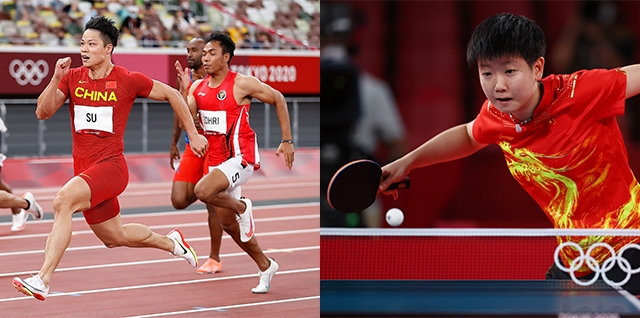
Su Bingtian (L) and Sun Yingsha compete at the Tokyo 2020 Olympic Games. XINHUA/IC
Though the Tokyo Olympic Games drew to a close on Aug 8, the public is still watching the athletes. Their outfits and the technologies that helped them in the competition have aroused people’s interest.
尽管东京奥运会已于8月8日落下帷幕,但运动员们仍是公众关注的焦点。在比赛中助力这些运动健儿们的设备与技术也引起了人们的兴趣。
Su Bingtian, the first Chinese sprinter to reach an Olympic 100m final, has ascribed his breakthrough to scientific training. “It takes Su 47 steps to run 100 meters. Each step counts,” Liang Dong, a member of Su’s training team, told Shenzhen Evening News. “Randy Huntington, Su’s American coach and a biomechanics expert in track and field, has collected a lot of data on outstanding sprinters and built a database. He put in all of Su’s data and got a near-optimal model. When Su is training, the team uses high-speed cameras to record his training and compares it with the model to find out his weaknesses.”
中国第一个进入奥运百米决赛的短跑运动员苏炳添,把他的突破归因于科学的训练。“苏炳添跑一百米需要47步。这里面每一步都是有讲究的,”苏炳添的训练团队成员梁栋在接受《深圳晚报》采访中表示。“苏炳添的美国教练兰迪•亨廷顿是生物力学在田径应用方面的专家,收集了很多杰出的短跑运动员的数据并建立了一个数据库。他输入了苏炳添的所有数据,得出了一个近乎完美的模型。当苏炳添在训练时,团队会用高速摄像机记录下他的训练,并将其与模型进行比较,找出他的弱点。”
Technology has also brought a new boost to table tennis. On July 27, the semifinal match between China’s Sun Yingsha and Japan’s Mima Ito was in full swing at the Tokyo Metropolitan Gymnasium. You wouldn’t have guessed that besides players, umpires and audiences, a powerful AI platform was monitoring the match.
科技也促进了乒乓球的新发展。7月27日,就在中国选手孙颖莎和日本选手伊藤美诚之间的半决赛在东京体育馆如火如荼地进行时,你绝对想不到除了球员、裁判和观众之外,还有一个强大的人工智能平台在监控比赛。
Every serve, swing and movement of Mima Ito was captured by this AI cloud platform deployed in Tokyo. At an average speed of 100 Mbps, the data was transmitted to the technical team of the Zhejiang University Table Tennis Intelligent Big Data Analysis Platform, 2,442 kilometers away from the Tokyo Metropolitan Gymnasium, according to The Paper.
伊藤美诚的每一次发球、挥拍、移动都被这个位于东京的人工智能云平台所记录下来。据澎湃新闻报道,这些数据以平均100Mbps的速度被传送到离体育馆2442公里外的浙江大学乒乓球智能大数据分析平台的技术团队手中。
The platform has stored the data of more than 8,000 matches so far. The research team has been working on match simulation since 2018. “Using big data and AI, we can precisely simulate and predict how the winning rate will change when players change certain tactics (策略),” Professor Wu Yingcai, the main developer of the platform, told CCTV-2.
到目前为止,该平台已经存储了8000多场比赛的数据。自2018年以来,研究团队一直致力于赛事模拟的研究。“利用大数据和人工智能,我们就可以进行模拟和推演,去预测当我方球员在改变某一种技战术的情况下,胜率会有怎么样的变化。”平台的主要开发者巫英才教授在央视财经频道采访中如此表示。
The Tokyo Olympic Games have seen not only scientific support in training, but many cutting-edge technologies in athletes’ devices. For example, the Kenya women’s volleyball team’s GPS devices fed data on each player’s strength, heart rate and so on to coaches, who used the information to prevent injury and personalize training plans for each individual, South China Morning Post reported.
东京奥运会上不仅有训练方面的科学支持,就连运动员的装备中也有许多尖端技术。例如,据《南华早报》报道,肯尼亚女子排球队的全球定位系统设备将每个运动员的力量、心率等数据反馈给教练,教练会利用这些信息来防止运动员受伤,并为每个人制定个性化的训练计划。
查看更多关于【双语新闻】的文章












